In today’s digital world, having a solid online presence is key to growing your business, and getting the hang of local keyword research is crucial—not just a nice-to-have.
This blog post is here to break it all down for you, offering the insights and strategies you need to really connect with your local market.
Whether you’re running a small shop, starting your digital marketing journey, or looking to polish your current approach, local keywords can boost your visibility and engage more customers.
Let’s dive into how you can make local keyword research easier to give your business a leg up in the busy digital arena.
What Is Local Keyword Research, and Why Is It Important?

Local keyword research is the process of finding and using local keywords that are relevant to your specific geographical area. This means including location-specific terms in your website content, such as city or neighborhood names, along with industry-related keywords.
But why is local keyword research important? For starters, it helps with local SEO so you can target potential customers who are searching for products or services within your area.
By incorporating the local SEO keywords for your business in your website and Google Business Profile, you can pop up in your local search engine results.
This can attract more relevant traffic to your website and increase the chances of converting those visitors into customers.
Local SEO keyword research improves your search engine ranking for location-based searches, making it easier for potential customers to find your local business.
How To Tackle Keyword Research For Local Businesses
Now that we know the importance of local keyword research, let’s dive into how to conduct it effectively.
Where To Find Keywords
One of the best places to start your local keyword research is by using Google’s Keyword Planner. This tool allows you to search for local SEO keywords and see their search volume, keyword difficulty, and suggested bids.
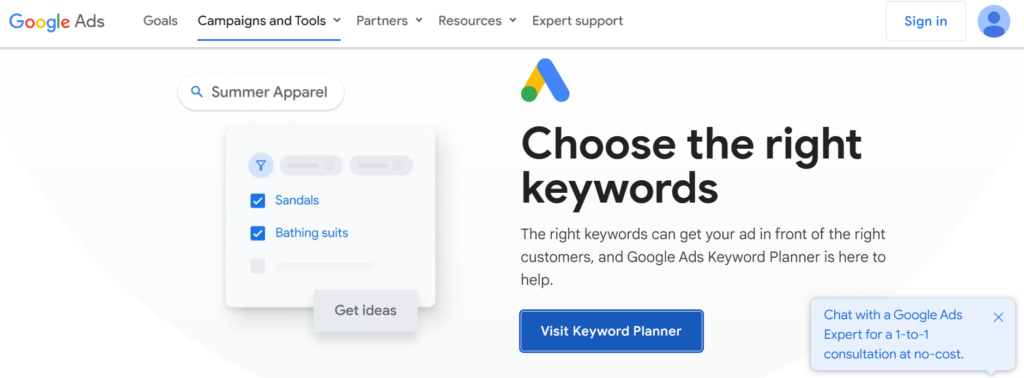

You can also use other keyword research tools, such as Semrush. But don’t worry – we’ll dig deeper into local SEO tools a little bit further in this article.
Additionally, you can gather some of the best local keyword ideas from review sites with local listings, like Yelp or TripAdvisor.
Look at the reviews of similar businesses in your area and note any keywords or phrases frequently mentioned.
These will give you insight into what potential customers are searching for when looking for businesses like yours.
Understanding Search Intent
When you conduct local keyword research, it’s important to consider the intent of what people are searching for.
A keyword has ‘local intent’ when most folks typing it into a search engine are looking for businesses close to where they are.
There are two types of local intent keywords: implicit and explicit keywords.
Implicit local keywords are where the location is already implied. Examples of implicit keywords:
- Pharmacy near me
- Closest bus station.
Explicit local keywords are where the user includes a specific location:
- Dentist in New York
- Opening hours for Apple store in San Francisco.
In all these cases, what people expect from their search is to find results that are geographically near where they are or where they plan on going.


Using Long-Tail Keywords
Long-tail keywords are phrases that contain more than three words and are more specific.
They may have lower search volumes but less competition, making it easier for your business to rank for them in the local search results.
This approach to local SEO will help you reach a more targeted audience of local searchers and increase your chances of ranking for that keyword.
An example of local search intent involves users searching for “Coffee shop with free wifi.” Local consumers searching for this want a place that’s not just any coffee shop but one that offers free wifi.
Other examples of long-tail keywords in local search might include:
- Organic food store for vegans
- Pet-friendly hotels
- Yoga classes for beginners.
By targeting long-tail keywords, your business can better understand your customers’ needs and ensure that you show up in the local results.
It allows you to create more specific and relevant content that speaks directly to your target audience about the products and services you offer.
With the rise of voice search, using long-tail keywords has become even more important. Voice searches tend to be longer, more conversational queries, making them similar to long-tail keywords.
By optimizing for these search queries, businesses can increase their chances of appearing in voice search results and reaching a wider audience.
Leveraging Location-Specific Keyword Modifiers
Add location-specific terms to help improve your local traffic from your target keyword. These are location keywords users might include in their search, such as city, state, neighborhood names, or even landmarks.
When I’m searching for a business or service, I often include local landmarks or specific neighborhoods in my search to find exactly what I need and where I need it.
For instance, instead of just typing in the search bar “Coffee shop near me,” I might search for something more precise like “Coffee shop with free Wi-Fi near Central Park entrance.”
This approach can help me quickly locate a coffee shop that’s situated near a landmark I’m planning to visit, making my search (and my trip!) much more efficient and targeted.
So, using detailed, location-specific keywords can really help get your business noticed by people searching for exactly the products or services you offer.
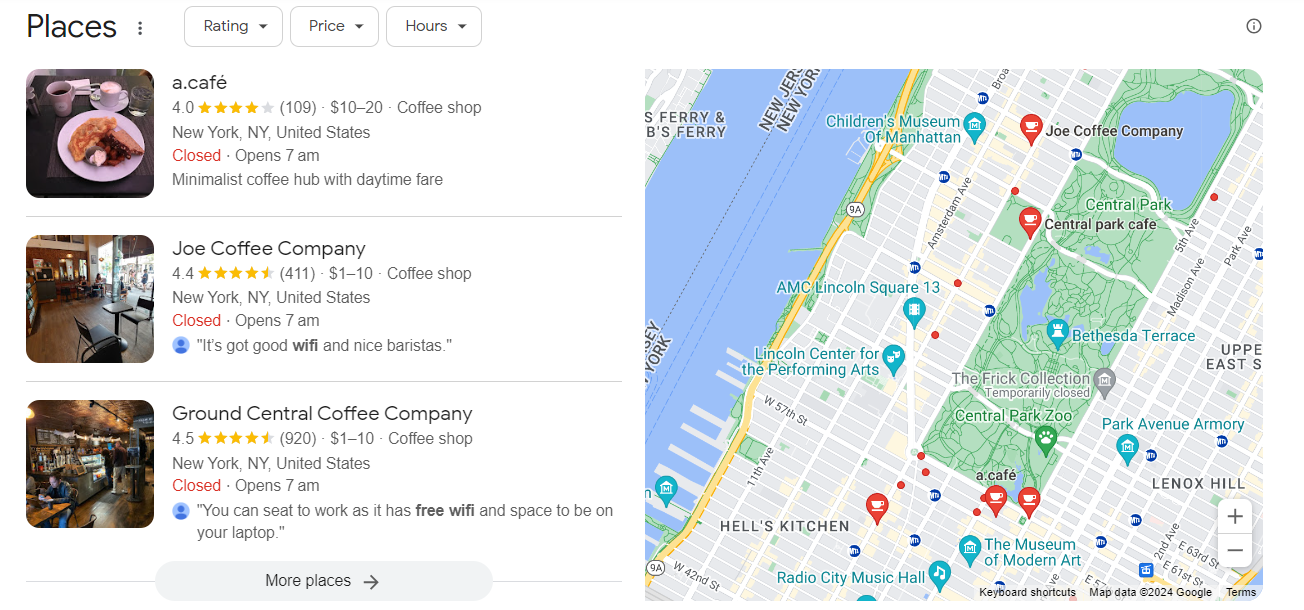

Other Considerations With Local Keyword Research
Aside from using the above tools and methods to develop relevant local keywords, here are other important factors to consider when conducting local keyword research.
Search Volume and Competition
Finding a balance between search volumes and competition is key when conducting local keyword research.
As I mentioned earlier, high search volume keywords may bring in more traffic, but they will also have higher competition and may be harder to rank for.
On the other hand, low-volume keywords may have less competition, but they may not bring in as much traffic from Google search results.
As part of your local SEO strategy – it’s important to choose a mix of both types in your target keywords.


Relevance To Local Audience
In addition to search query volume and competition, it’s crucial to consider the relevance of your keywords to your local audience.
This means understanding their language and terminology in your local keywords and any specific landmarks or neighborhoods that are important to them.
Using regional phrases makes your business more memorable and appealing to residents who use those terms often in their daily conversations, e.g., using the word “Hoagie” to mean “Submarine Sandwich” in Philadelphia.
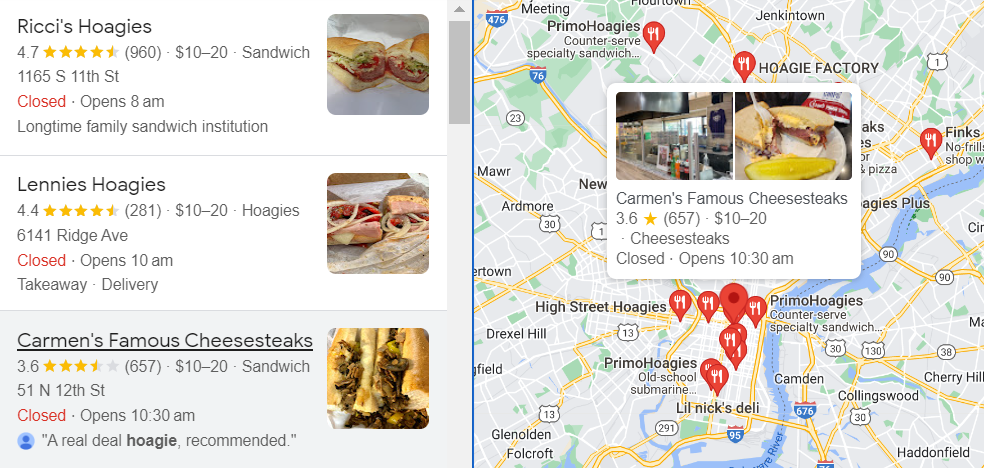

Tracking and Analyzing Keyword Performance
Once you have selected and implemented your local keywords, it’s important to track their performance and make adjustments as needed.
This can be done through tools like Google Analytics, Google Search Console, or keyword tracking software.
By regularly monitoring your keyword performance and where you’re showing up in the local search results, you can identify which ones bring in the most traffic and conversions and adjust your strategy accordingly.
Get Listed in Online Directories and Review Sites
Online directories and review sites like Google Business Profile, Yelp, and TripAdvisor are powerful tools for local businesses.
Not only do local business listings provide valuable information for potential customers, but they also help with local SEO, making you more likely to appear in the search results.
One of the biggest mistakes I see local business owners making is neglecting these platforms. It’s such a quick and easy way to improve your local business’s ranking in the search engines.
Make sure your business is listed, and regularly update your information.
Going back to my coffee shop example search, you can see the top 2 results below the maps results are directories, so don’t underestimate their impact on helping you find local customers.
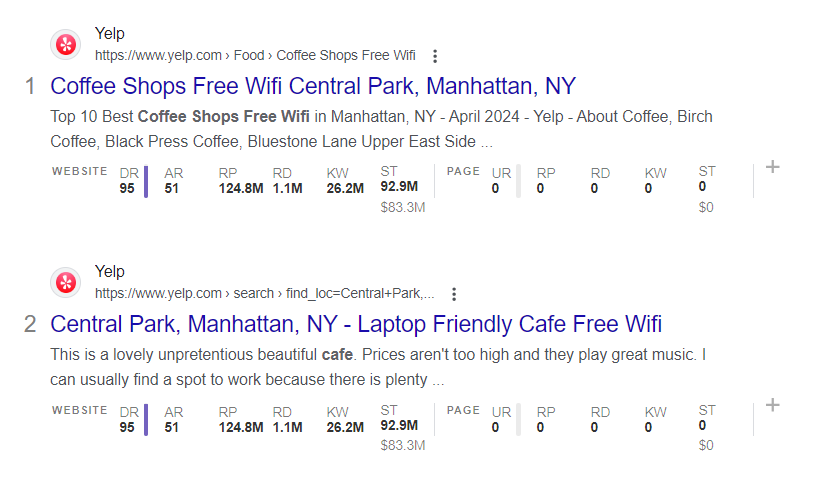

How to Handle Local Keyword Research with Multiple Locations?
If your business has multiple locations, it’s important to conduct local keyword research to find local keywords for each location.
This will help you better target the relevant keywords for each individual location and attract potential customers conducting local searches in those areas.
Here are some tips for handling local keyword research with more than one location:
- Build Location-Specific Landing Pages: Create landing pages for each location on your website, using relevant local keywords throughout the content. This will help with local SEO and allow you to tailor the information and offerings for each location.
- Monitor Local Search Trends: Keep an eye on local search trends and adjust your keywords accordingly. For example, if a particular location is experiencing a surge in interest for a certain product or service, incorporate those relevant local keywords into your content.
- Leverage Local Reviews: Pay attention to customer reviews and feedback in each location. This can provide valuable insights into what local keywords are resonating with your target audience.
- Use Location-Specific Keywords in Title Tags and Meta Descriptions: Including location-specific keywords in title tags and meta descriptions can help improve your visibility for local searches.
As promised, here are some useful keyword research tools that can help local businesses:
Google Keyword Planner
Google Keyword Planner is a tool for keyword research. It offers insights into search volume, competition, and suggested bids for local keywords and lets you filter results by location.
Semrush
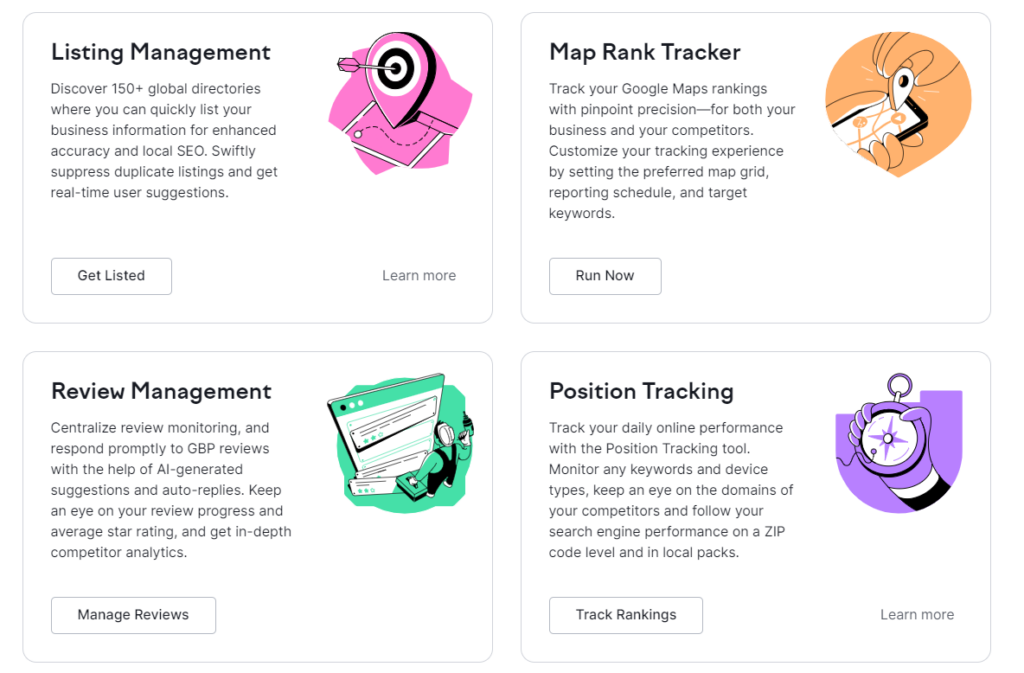

Semrush is a comprehensive SEO tool that includes keyword research, competitor analysis, and local SEO features such as listings management. It also allows you to track local keyword rankings.
SERPs
Search engine results pages (SERPs) are a valuable keyword research tool.
By simply performing a Google search for your target keywords, you can see what other businesses appear in the top results for related keywords and get an idea of the competition in your area.
Final Thoughts on Local Keyword Research
Local keyword research is a crucial step in any local SEO strategy.
By understanding your target audience and conducting thorough research to find the right keywords, you can optimize your website for relevant, high-performing keywords that will attract customers performing local searches to your business.
Remember to regularly track and analyze your keyword performance to continuously improve and refine your strategy.
With the right approach, you can find the best local keywords to boost your business’s online visibility in the Google search results and attract more local customers.
Overall, keyword research is an ongoing process, and it’s important to review and update your strategy regularly to stay ahead of the competition and effectively reach your target audience.
By following these tips and staying up-to-date with current search trends, you can improve your local SEO efforts and find the best local keywords to drive more traffic to your business. Check out our article on ChatGPT for local SEO next.
